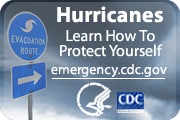Calvert County Health Department
- Adult Evaluation Reviews (AERS)
- Breast and Cervical Cancer Program
- Destination Wellness
- Developmental Disabilities Program
- Health Insurance Programs
- Home and Community-Based Services
- Maternal and Child Health
- Medical Assistance Program
- Medical Assistance Transportation Program
- Reproductive Health
- Reproductive Health Clinic Schedule
- Child Safety Seats
- Colorectal Cancer Awareness & Screening
- Diabetes and Prediabetes
- E-Cigarettes and Vaping
- Heart Health
- Injury Prevention
- Oral Cancer Prevention
- Poison Prevention
- Responsible Tobacco Retailer Program
- Skin Cancer Awareness
- Tobacco Cessation Program
- Stroke Awareness
- Tobacco Cessation for Pregnant Women
- Tobacco Use Prevention

Hurricane Season is Here
Did you know that hurricane season starts on June 1st and goes to the end of November? Are you ready? Is your family ready?
Plan ahead:
- Home emergency supplies
- Refill medications prior to storm- minimum of 7 day supply
- Water – one gallon per person per day 3 to 5 day minimum
- Food supplies for 3-5 days
- Non electric can opener
- Portable battery powered radio
- Additional batteries
- Charge your devices
- Face covering/masks
- hand sanitizer/disinfectant wipes
- Make a plan for your family
- Child Care
- Elder care
- Pet care – food, a crate to carry pet (if possible)
- Make plans to check on the elderly and disabled in your neighborhood
- If you need to evacuate – have a plan in place
- Have a full tank of gas in your truck or car
- Have road maps – you may be on unfamiliar roads
- If separated from your family, have a pre-arranged meeting place
- If possible, have a place to evacuate to, i.e. – relative or friends
- Per plan several evacuation routes – the main route may be blocked or flooded
- Have an emergency supply kit to take with you, to include:
- Medications, for everyone including pets
- Clothing
- Important papers and phone numbers
- Non perishable food
- Additional water
During a storm:
- Stay tuned to radio and televisions for official weather information and local directions
- Follow instructions given by local and state emergency officials
- Turn your refrigerator to the maximum cold setting – this will help keep your food cold longer if there is a power failure
- Fill bathtub and other containers with additional water
- If you have well water, not much comes out of the faucet once the power goes out
Listed below are tips and resources that you can use to be prepared.
Plan ahead:
- Have an emergency kit and supplies
- Prepare your family
- Evacuation and sheltering in place
- Prepare for Emergencies Now: Information for People with Disabilities
Other useful links:
http://www.foodsafety.gov/keep/charts/refridg_food.html
http://www.fda.gov/Food/ResourcesForYou/Consumers/ucm076881.htm
http://www.redcross.org/prepare/disaster/power-outage/safe-generator-use
https://www.ready.gov/hurricanes
http://www.fda.gov/NewsEvents/PublicHealthFocus/ucm064572.htm
